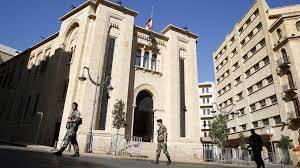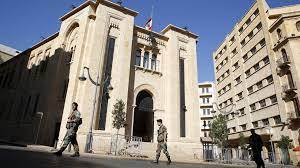The newspaper "Asharq Al-Awsat" reported that the "financial recovery plan" and "capital control law," which the International Monetary Fund (IMF) requested the Lebanese government to approve, faced a setback yesterday due to political divisions that prevented the continuation of the law's discussion in parliamentary committees. Lawmakers linked the discussion of the draft law to the "recovery plan," which in turn ignited public protests and strikes, as people rejected placing the burden of losses on depositors. At least three demands made by the IMF became entangled in political disputes, raising concerns that the preliminary agreement with the Fund, signed by Lebanon last week, is now "at risk of further delay," according to economic and parliamentary sources. The IMF required the approval of the public finance budget, the "capital control" law, and the "recovery plan," all of which appear to be postponed until after the elections.
Despite escalating election campaigns against each other, there was an agreement on a unified stance between the "Free Patriotic Movement" and the "Lebanese Forces," as the joint parliamentary committee meeting, tasked with further studying the "capital control" law, could not convene when the "strong republic" and "strong Lebanon" lawmakers insisted on discussing the law only after reviewing the "recovery plan." This stance aligns with support for passing the law from Prime Minister Najib Mikati and lawmakers from "Amal Movement" and "Hezbollah."
The "recovery plan," details of which were exclusively reported by "Asharq Al-Awsat" yesterday, has sparked widespread controversy since it proposes that banks and depositors bear $60 billion of losses incurred by the Lebanese state due to the crisis, which has faced significant political, public, and union rejection. This discontent led to public movements outside the parliament, attempting to obstruct lawmakers' access to the building.
The capital control law faced a political approach that undermined its potential approval before the elections, as parliamentary sources told "Asharq Al-Awsat," noting that no new session has been scheduled yet, with only three weeks left before the elections, including the holidays of Easter and Eid al-Fitr, implying discussions will be postponed until after the elections.
The approaches to this law intertwined political and technical aspects. Ali Darwish, a member of the "Independent Center" bloc (led by Mikati), said that the "capital control" issue is inherently "complex" and should have been approved at the onset of the crisis. However, mismanagement has resulted in a problem that has now become entwined with technical and political facets. Darwish explained to "Asharq Al-Awsat" that opponents of the law "linked its discussion to the recovery plan," although the two matters are separate, arguing that part of this linkage is "political," which has led to the delay of the file until after the elections.
According to Darwish, the "capital control law" seeks to balance the rights of individuals to withdraw their deposits with protecting the institutions housing these funds, namely the banks. However, this balance "was not convincing to some parliamentary blocs, leading matters towards a political trajectory and creating a debate that transcends technical aspects."
Darwish believes that Lebanon is currently "paying the price of internal political contradictions and grappling," emphasizing that a significant portion of the issues cannot be handled with stagnation. He clarified that working within the current framework "will not yield results despite the government's efforts and Prime Minister Najib Mikati's endeavors to dismantle obstacles and place Lebanon on the recovery track," adding, "We remain hopeful that the elections will generate a shock and create a new dynamic in the next parliament to solve problems instead of exacerbating them."
In yesterday's events, the joint committee session dedicated to continuing the discussion of the "capital control" law did not convene after members from the "strong republic" and "strong Lebanon" blocs communicated their rejection of discussing it before reviewing the "recovery plan." Deputy Speaker of Parliament Elie Ferzli, who heads the committee meetings, stated, "Under no circumstances should there be capital control without a recovery plan that defines losses and responsibilities, with the primary responsibility resting on those who borrowed money, followed by the Central Bank and the banks." He affirmed that parliament would not pass any law "that undermines the rights of depositors," adding, "The international community, the government, and various institutions dealing with financial matters must understand that negotiations regarding depositors' rights are impermissible."
Meanwhile, George Adwan, head of the Administration and Justice Committee, stated that "any assertion about protecting depositors by the Prime Minister is incorrect." He called for "a plan that defines responsibilities first, after which the discussion of capital control can take place," adding, "Any discussion outside the framework of defining responsibilities and distributing losses means plunging the country into uncertainty."
Ibrahim Kanaan, head of the Finance and Budget Committee, affirmed, "We are ready to continue the discussions on capital control after modifying it based on clear data from the government that does not place the depositor responsible for the dilapidated state, but rather the Central Bank, the banks, and the state." Kanaan, a member of the "strong Lebanon" bloc, demanded "transparency from the government regarding the realities," considering that "the government's inquiry about its plan widely circulated in the media and what it will do about people's deposits is not a crime; rather, it's a right in light of the leaked information regarding the recovery plan."
Kanaan underscored that what occurred "does not mean we want to cease discussions on the capital control law, but it should come within a clear vision," adding that "legislation during election periods of such significance is not advisable, and if we could not pass the capital control law now, there will be a new popular legitimacy and a parliamentary assembly after the elections."
For his part, Hadi Abu Al-Hassan, Secretary of the "Democratic Gathering" bloc, emphasized the need for "the distribution of losses, so that the state bears primary responsibility along with the Central Bank, the banks, and those who benefited from exorbitant profits and financial engineering." He added, "As for the depositors, they have rights that we adamantly reject to squander," stressing the importance of "protecting the middle class in Lebanon, as it is the primary drive for revitalizing the Lebanese economy, and thus harming them by damaging their deposits is something we, as the Democratic Gathering, reject."




